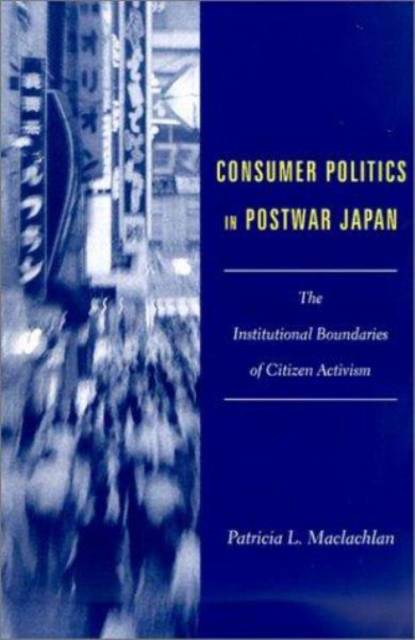
- Afhalen na 1 uur in een winkel met voorraad
- Gratis thuislevering in België vanaf € 30
- Ruim aanbod met 7 miljoen producten
- Afhalen na 1 uur in een winkel met voorraad
- Gratis thuislevering in België vanaf € 30
- Ruim aanbod met 7 miljoen producten
Zoeken
Consumer Politics in Postwar Japan
The Institutional Boundaries of Citizen Activism
Patricia MacLachlan
€ 54,45
+ 108 punten
Omschrijving
Providing comparisons to the United States and Britain, this book examines Japan's postwar consumer protection movement. Organized largely by and for housewives and spurred by major cases of price gouging and product contamination, the movement led to the passage of basic consumer protection legislation in 1968. Although much of the story concerns the famous "iron triangle" of big business, national bureaucrats, and conservative party politics, Maclachlan takes a broader perspective. She points to the importance of activity at the local level, the role of minority parties, the limited utility of the courts, and the place of lawyers and academics in providing access to power. These mild social strategies have resulted in a significant amount of consumer protection.
Specificaties
Betrokkenen
- Auteur(s):
- Uitgeverij:
Inhoud
- Aantal bladzijden:
- 270
- Taal:
- Engels
- Reeks:
Eigenschappen
- Productcode (EAN):
- 9780231123471
- Verschijningsdatum:
- 26/12/2001
- Uitvoering:
- Paperback
- Formaat:
- Trade paperback (VS)
- Afmetingen:
- 153 mm x 227 mm
- Gewicht:
- 449 g

Alleen bij Standaard Boekhandel
+ 108 punten op je klantenkaart van Standaard Boekhandel
Beoordelingen
We publiceren alleen reviews die voldoen aan de voorwaarden voor reviews. Bekijk onze voorwaarden voor reviews.











